| Srl | Item |
| 1 |
ID:
173096
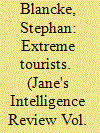

|
|
|
| 2 |
ID:
126354
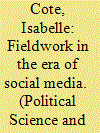

|
|
|
|
|
| Publication |
2013.
|
| Summary/Abstract |
Social networking sites have recently garnered academic attention for their role in fostering democracy and openness in both developed and developing regions. Unfortunately, in political science, this newfound interest has not yet translated into a greater interest in social media as a methodological tool for researchers conducting fieldwork. How has the era of social media influenced the way political scientists conduct their fieldwork? How can researchers make the most of the opportunities offered by social networking sites while abiding by the strict standards of their ethics board? This article highlights the potential in social networking sites for recruiting participants and gathering data and looks at the impact sites such as Facebook have had on building and maintaining trust with research participants. In contrast, it explores how social media may compromise one's ability to uphold the "do no harm" principle guiding all academic research by jeopardizing participants' confidentiality and anonymity, a risk deemed especially high for vulnerable populations or sensitive regions. Insight gleaned from the researcher's own fieldwork in two minority provinces of Indonesia in 2010-2011 is used as a case in point.
|
|
|
|
|
|
|
|
|
|
|
|
|
|
|
|
| 3 |
ID:
097844
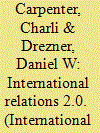

|
|
|
|
|
| Publication |
2010.
|
| Summary/Abstract |
The International Relations (IR) profession has not fully taken stock of the way in which user-driven information technologies-including Blogger, Facebook, Twitter, YouTube, and Wikipedia-are reshaping our professional activities, our subject matter, and even the constitutive rules of the discipline itself. In this study, we reflect on the ways in which our own roles and identities as IR scholars have evolved since the advent of "Web 2.0": the second revolution in communications technology that redefined the relationship between producers and consumers of online information. We focus on two types of new media particularly relevant to the practice and the profession of IR: blogs and social networking sites.
|
|
|
|
|
|
|
|
|
|
|
|
|
|
|
|
| 4 |
ID:
095850
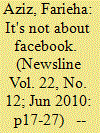

|
|
|
| 5 |
ID:
108367
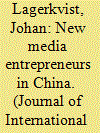

|
|
|
| 6 |
ID:
090520
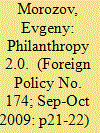

|
|
|
|
|
| Publication |
2009.
|
| Summary/Abstract |
Even the most skeptical observers of technology cannot deny that the advent of new media characterised by revolution in self publishing and the forthcoming arrival of the next billion Internet users has the capacity to radically transform the world of philanthropy.
|
|
|
|
|
|
|
|
|
|
|
|
|
|
|
|
| 7 |
ID:
114951


|
|
|
|
|
| Publication |
2012.
|
| Summary/Abstract |
This article compares the web presence of the Communist Party of the Russian Federation and the British Liberal Democrats in order both to analyse the ability of the internet to strengthen parties as political institutions as well as to reflect upon the relative democratic value of parties online in different types of regimes. The article compares the party websites in early 2010 through an analysis of online audience, web links, content posted by parties and user-generated material linked to the two parties. The research found that the online potential of party communication, despite the universal availability of powerful tools of information distribution and social networking opportunities, was far more closely tied to national political culture than to cyber-culture in general. The Communist Party web activity tended to parallel the party activity offline, failing to craft the appearance of a more modern or inclusive party. At the same time, supporters of the British Liberal Democrats made greater use of external social networking and were apparently more connected with the broader political sphere, although perhaps at the expense of party branding and control. The findings demonstrate the need to understand how national political organisations and attitudes can play a much stronger role than technological potential in shaping the democratising forces of the online sphere.
|
|
|
|
|
|
|
|
|
|
|
|
|
|
|
|
| 8 |
ID:
117730
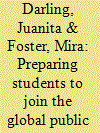

|
|
|
|
|
| Publication |
2012.
|
| Summary/Abstract |
Just as public policy was once debated over newspapers in Parisian cafes, today's global policy debates take place in the blogosphere and on social networks. Admission to the lettered city of the twenty-first century demands not just constant connectivity but also rapid comprehension and succinct writing. Preparing students to participate in the global public sphere requires supplementing their directed research skills with monitoring skills, then showing them how to communicate in public debate. In selected undergraduate International Relations courses at San Francisco State University, students hone monitoring skills by following news feeds in RSS feed readers and course management systems. Textbooks then become a source of context for understanding the latest developments in regional issues. Suggested Web sites and a Facebook forum provide students with access and encouragement to communicate with experts on course topics. By engaging online, students repurpose technologies and social skills from their daily lives for educational ends. Examination questions cover relevant current events, briefing papers replace term papers, and course assessment measures reward students for experimenting and improving throughout the semester. Because this approach to online participation and current events monitoring may be unfamiliar to students, the course design and simulation activities encourage students to draw on small group support while developing their individual skills and confidence.
|
|
|
|
|
|
|
|
|
|
|
|
|
|
|
|
| 9 |
ID:
129093
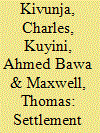

|
|
|
|
|
| Publication |
2014.
|
| Summary/Abstract |
Cast in the framework of social capital theory, this research used case studies to investigate the settlement experiences of African migrants in Armidale, Tamworth and Coffs Harbour in Australia. Analysis of individual (n = 29) and one focus group interview data revealed that most migrants expressed some satisfaction with service provision in the areas of initial settlement support and the work of local community organizations. Problems still remained with regard to employment, family reunion and dealing with changes in family relations. The study concludes that there is a need to educate African migrants on mainstream Australian culture in order to enhance the migrants' capacity to build social capital. Local governments need to make specific provisions within their policies, focusing on the settlement of migrants to address some of the gaps in services.
|
|
|
|
|
|
|
|
|
|
|
|
|
|
|
|
| 10 |
ID:
100964
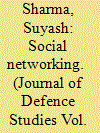

|
|
|
|
|
| Publication |
2010.
|
| Summary/Abstract |
The social networking sites can be exploited by the cyber operators by infiltration and influencing the opinion where feasible. Cyber espionage has already became the cornerstone of some nations, where international cyber security agencies have reasons to believe, of state complicity in major hacking, denial of service attacks in the last couple of years. Since social networks become easy prey to such agencies, there is a need to increase awareness of defence personal about their vulnerabilities.
|
|
|
|
|
|
|
|
|
|
|
|
|
|
|
|
| 11 |
ID:
093826
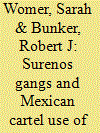

|
|
|
|
|
| Publication |
2010.
|
| Summary/Abstract |
Narco use of the Internet, specifically social networking sites by Surenos gang and Mexican cartel members, is a rich yet underexplored area of research in open venues because of its sensitive nature. This essay provides overviews of Surenos gang and Mexican cartel use of the Internet by means of viewing and analyzing primary Internet sources linked to purported narcotics groups and their associates. These patterns of use were then compared to more sophisticated Internet use by terrorist groups with similarities and contrasts noted. This essay concludes with a few general observations concerning likely narco Internet use patterns that will emerge.
|
|
|
|
|
|
|
|
|
|
|
|
|
|
|
|
| 12 |
ID:
122675


|
|
|
|
|
| Publication |
2012.
|
| Summary/Abstract |
The recent protests and uprisings in Tunisia and Egypt have both been called "Twitter revolutions"
and "Facebook revolutions" due to the widespread use of user-generated content disseminated
over social networks like Facebook and Twitter by protesters, activists and supporters of the
protests, as well as by those following the events around the globe.
|
|
|
|
|
|
|
|
|
|
|
|
|
|
|
|
| 13 |
ID:
095853


|
|
|